The Chinese Academy of Engineering (CAE) and IWHR jointly hosted an international seminar, presented by academicians and senior researchers from UK and China, at IWHR on June 27, 2023.
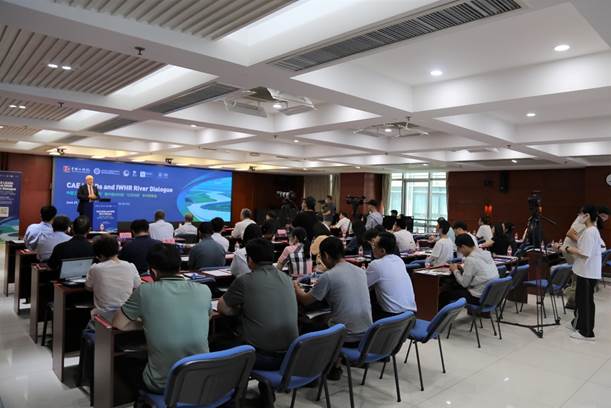
Titled “CAE LEADs and IWHR River Dialogue”, the seminar expounded on the role of river-related science, technologies and policy-making in fueling China’s national river strategies and contributing to the United Nations 2030 Sustainable Development Agenda and dived into the social, economic, ecological and scientific dimensions of global and regional water security.
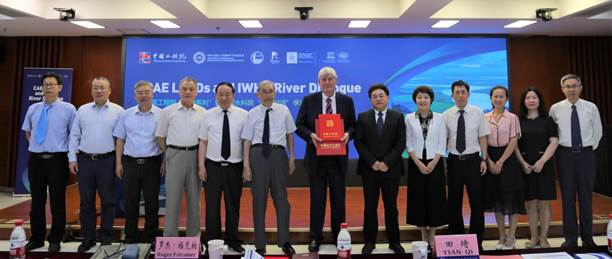
Before the lectures began, Professor Roger Falconer, a fellow of the UK Royal Academy of Engineering and a foreign member of CAE, received the Chinese Government’s Friendship Award, certificate of CAE LEADs lecture, and certificate of IWHR Honorary Professor.
A long-time friend of the Chinese water community, Professor Falconer has been “working on some important topics with Chinese people.”[1] since the 1980s, quoting himself. During his tenure as the past President of the International Association for Hydro-Environment Engineering and Research (IAHR), he made a forward-looking and rewarding move to establish IAHR’s second headquarters office in Beijing and have it stationed at IWHR in 2015.
Such a good friend is “hard to find and lucky to have,” said IWHR Vice President Dr. Peng Jing, also Secretary-General of IAHR. She thanked Professor Falconer for his long-lasting support for China’s development and talent cultivation.
The IAHR Beijing Office has been “incredibly successful,” noted Professor Falconer, saying he was proud of his tie with China during the past 30 years.
International experts have been important drivers for China’s modernization, said Professor Tian Qi, Director General of CAE’s Department of International Cooperation and Professor Zhu Jiang, Deputy Director of the International Economic and Technical Cooperation and Exchange Center, China’s Ministry of Water Resources. Both stated China’s willingness to expand and deepen international science and technology cooperation.
Professor Falconer gave his report at the Lecture session later, together with Prof. Chen Zuyu and Dr. Zhao Yong, both from IWHR, to shed light on water environmental research and global water security.
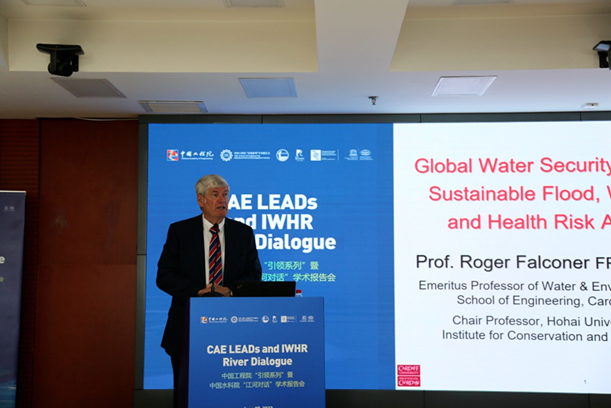
Professor Roger Falconer giving a talk on Global Water Security: Modelling for Sustainable Flood, Water Quality and Health Risk Assessment
The presentation first introduced some of the key challenges of water security and the related challenges of flood, water quality and health risk assessment, followed with an overview of several projects relating to river and coastal basin management in the U.K., including: (i) flood risk modelling of extreme flood events and the stability of people and vehicles in urban floods, (ii) coastal reservoir modelling and the management of eutrophication and algal blooms, and (iii) faecal bacteria modelling from source to sea in compliance with the European Union Bathing and Shellfish Waters Directives and predictions of health risk assessment. The findings highlighted the need for: (i) refined modelling for extreme flood events, (ii) the challenges of managing eutrophication in near stagnant water bodies, and (iii) the importance of sediment transport as a vector of water quality constituents and the need for engineers to work with scientists in modelling complex bio-kinetic processes.
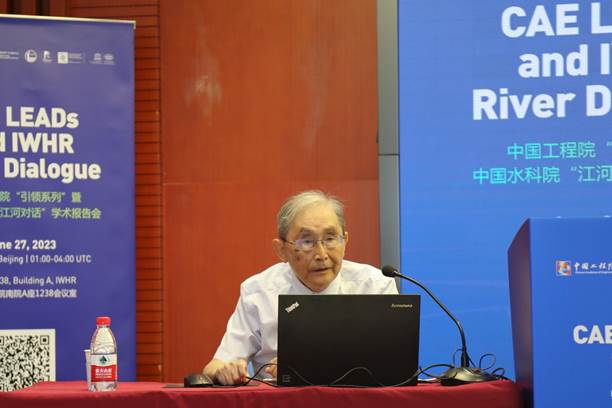
Professor Chen Zuyu giving a talk on the advances in dam breach flood evaluation
Professor Chen Zuyu, member of the Chinese Academy of Sciences from IWHR gave a talk on the advances in dam breach flood evaluation. The report sheds light on the latest progress in field prototype tests, theoretical studies, computer programs and practical applications in dam breach analysis, and presents the case study of the dam breach of the Baige barrier lake in China in 2018. Concluded is that quantitative dam breach analysis allows an optimized hazard mitigation response to save lives and properties.
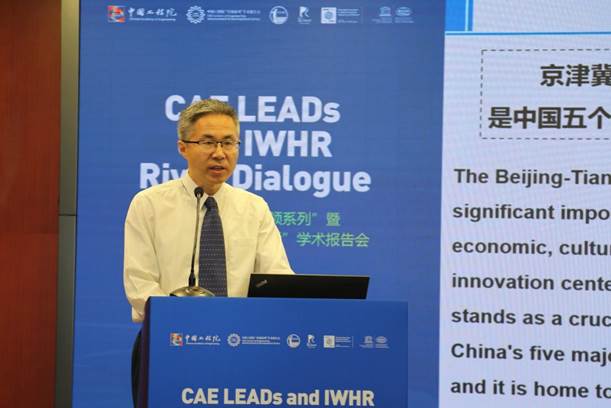
Professor Zhao Yong giving a talk on the challenges and solutions to water security in the Beijing-Tianjin-Hebei region
Professor Zhao Yong, Deputy Director from IWHR Department of Water Resources gave a talk on the challenges and solutions to water security in the Beijing-Tianjin-Hebei region. The report highlighted water challenges, including limited and declining total water resources, insufficient water-carrying capacity, and water environment degradation, in China’s Beijing-Tianjin-Hebei region. To restore the river and lake ecology of that region, restore groundwater level, and ensure reasonable use of water for socioeconomic development for that region, the report provides measures such as demand regulation, optimization of water supply, and smart management.

Professor Cheng Xiaotao chairing the River Dialogue
The River Dialogue was a panel discussion named after River, an IWHR-launched open-access English journal as a high-quality exchange platform for the international water community. It was chaired by Professor Cheng Xiaotao from IWHR, joined by all the three keynote speakers as well as Professor Xia Junqiang, Deputy Dean of Wuhan University’s School of Water Resources and Hydropower Engineering, and Professor Wang Fang from Peking University’s College of Architecture and Landscape.
Discussions at the River Dialogue dived into urban flooding, hydrology and water resources, possible impacts of sea water flow, water resources and regional economy, water-food-energy system, etc.
Playback of opening remarks, lectures, and the River Dialogue is available. Click here or scan the QR code below to view:
